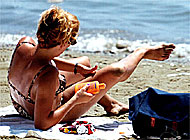Skin cancer experts convene in Zurich

Swiss scientists are presenting details of their cutting edge research on melanoma vaccines at the eighth world congress on skin cancers in Zurich.
Some 650 physicians and scientists from more than 40 countries have gathered to discuss the latest advances in prevention, diagnosis, treatment and research.
The department of dermatology of the university hospital of Zurich was one of the first places in the world to use a vaccine to combat malignant melanoma, the most serious form of skin cancer.
Globally, the work has inspired other groups working on lung, renal and prostate cancers.
“Worldwide, we are really a leading group of experts in immuno-therapy vaccination of melanoma,” said Frank Nestle, a member of the Zurich team and secretary of the world congress.
In 1996, the group developed an approach using the body’s own immune cells or dendritic cells to vaccinate advanced melanoma patients.
Switzerland has one of the highest incidences of skin cancer in the world and both the number of cases and mortality are rising. Each year about 10,000 people in Switzerland learn that they have skin cancer. About 1,000 of those cancers are melanoma and of those melanoma cases, around 200 patients will ultimately die from the disease.
“Prevention and early diagnosis are priorities,” said Nestle. “We know the risk factors for skin cancer and one of the decisive risk factors is UV radiation so protection from the sun, especially at a young age, is a very effective means of prevention.”
“The second important point is early diagnosis of melanoma and work with computer based imaging techniques has led to great progress in this field. In nine out of ten patients if you diagnose melanoma early then you can cure the patient by excision of the tumour. We really have to spread the message that if skin cancer is detected early it is curable.”
Among topics at the conference, which runs through Saturday, are non-surgical treatment of skin cancers, gene therapy and alternative treatments, as well as psychosocial aspects of skin disease.
by Vincent Landon

In compliance with the JTI standards
More: SWI swissinfo.ch certified by the Journalism Trust Initiative
You can find an overview of ongoing debates with our journalists here . Please join us!
If you want to start a conversation about a topic raised in this article or want to report factual errors, email us at english@swissinfo.ch.